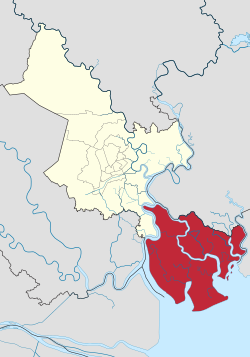Cần Giờ district
Cần Giờ district
Huyện Cần Giờ | |
|---|---|
 Cần Giờ in the metropolitan area of HCMC | |
| Coordinates: 10°30′43″N 106°52′50″E / 10.51194°N 106.88056°E | |
| Country | |
| Centrally governed city | Ho Chi Minh City |
| Seat | Cần Thạnh Town |
| Divisions | 1 township (thị trấn), 6 communes (xã) |
| Area | |
| • Total | 704 km2 (272 sq mi) |
| Population (2019) | |
| • Total | 71,526 |
| • Density | 100/km2 (260/sq mi) |
| Time zone | UTC+07 (ICT) |
| Website | cangio.hochiminhcity.gov.vn |
Cần Giờ is a coastal suburban district of Ho Chi Minh City, in the Southeast region of Vietnam.
The district is located 50 km from downtown Ho Chi Minh City. As of 2019, the district had an area of 704,45 km² and population of 71,526.[1][2] Cần Giờ is home to Cần Giờ Mangrove Forest, a biosphere reserve listed by UNESCO.
Geographical location
[edit]Cần Giờ borders Nhà Bè district to the north, Long An and Tiền Giang provinces to the west, Đồng Nai province to the northeast, Bà Rịa–Vũng Tàu province to the southeast, and the East Sea to the south. The district is bordered on the West by the Soai Rap river, which currently connects through the Binh Khanh Ferry Terminal, with plans to construct the Cần Giờ Bridge.[3]
Administration
[edit]Cần Giờ district includes the town of Cần Thạnh and six communes:
|
|
References
[edit]- ^ rever.vn. "Đánh giá thị trường bất động sản khu vực Cần Giờ T11/2024". rever.vn (in Vietnamese). Retrieved 2024-11-07.
- ^ Huy, Bùi Đức; maisonoffice.vn (2023-11-22). "Bản đồ Huyện Cần Giờ TPHCM [Cập nhật mới nhất]". Maison Office (in Vietnamese). Retrieved 2024-11-07.
- ^ "Work on Can Gio Bridge to start in 2022". The Saigon Times. June 23, 2020. Archived from the original on May 24, 2022. Retrieved November 9, 2021.




